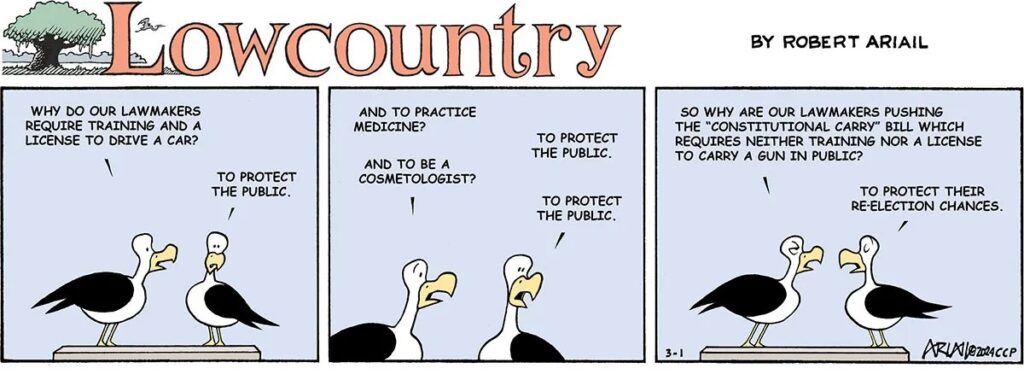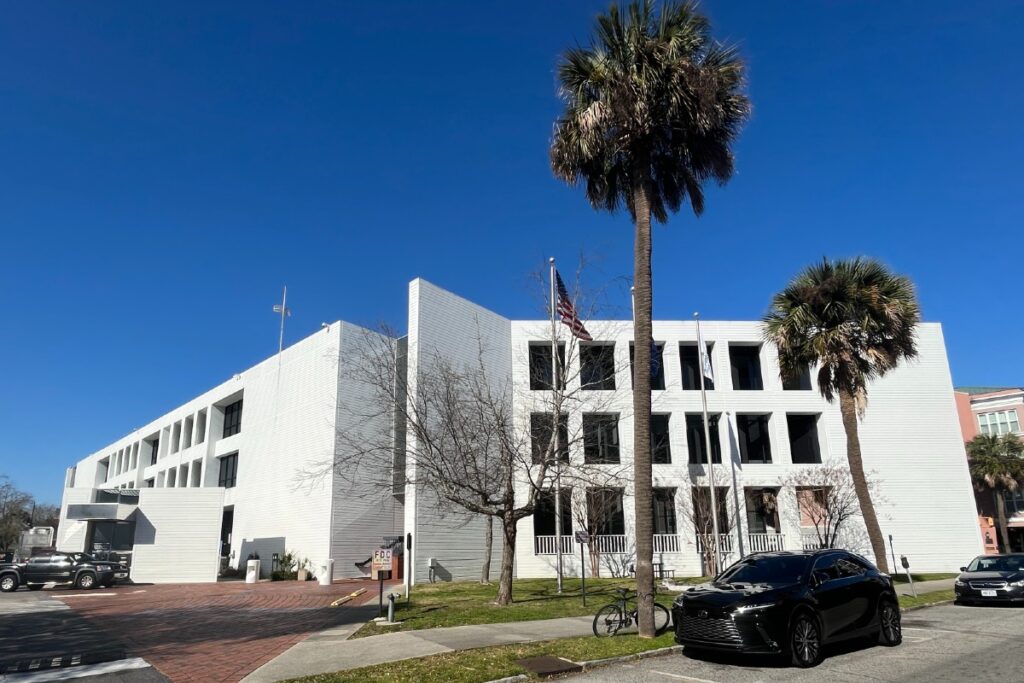STATEHOUSE REPORT | ISSUE 23.09 | March 1, 2024
BIG STORY: Fight ensues over state’s “antiquated” cosmetology law
MORE NEWS: State lawmakers propose IVF protections
LOWCOUNTRY, Ariail: The protection gambit
COMMENTARY, Brack: Send this energy turkey back to where it came from
SPOTLIGHT: S.C. Farm Bureau
MYSTERY PHOTO: Angles
FEEDBACK: Fetal heartbeat law limits family options
Fight ensues over old S.C. cosmetology law

By Jack O’Toole | A Charleston businesswoman’s battle against what she calls South Carolina’s “antiquated” cosmetology laws is powering a major push for licensing reform in the state legislature.
Megan O’Brien moved from California to Charleston a year and a half ago with a simple business idea: at-home beauty services like hair styling and makeup application for everyone from housebound senior citizens to brides-to-be.

The problem, as she soon discovered, was that her idea is illegal in the state of South Carolina where cosmetologists are forbidden from working outside of a brick-and-mortar salon.
“It was brought to my attention by people who owned a cosmetology school as a way to deter me, I think,” O’Brien said in an interview. “They said, ‘You’re never going to be able do this – the cosmetology board is really strong in this state – so you should just go do this business somewhere else.’”
Today, O’Brien’s business, Ring My Belle, reflects that advice, with successful operations in several cities across the country, including Los Angeles, Las Vegas and Boston. But here in its home base of Charleston, the service remains illegal – a situation that O’Brien believes may be about to change, thanks in part to a powerful ally she’s found in the fight.
“I’ve been working for a year and a half to try to change the law,” she said. “I went on TV, I started petitions, I did all sorts of things. But it didn’t really begin to move until I found out about the Institute for Justice.”
Libertarian economics as social justice?
Dubbed “a merry band of libertarian lawyers” by the columnist George Will, the nonprofit Institute for Justice (IJ) came into existence in 1990 to pursue what it sees as the cause of economic liberty through the court system. In particular, its work has tended to focus on three major issues: occupational licensing, property rights and free speech.
IJ’s previous work in S.C. has included a successful challenge to Charleston’s tour guide licensing ordinance, which a federal court found to be unconstitutional, and passage of a law limiting the power of state licensing boards to deny occupational licenses to people with criminal histories.
Just weeks after O’Brien contacted IJ, legislation (S. 857) to allow mobile cosmetology was introduced in the state Senate, along with amendments to more fully deregulate the industry.
According to IJ, this larger push for deregulation is a question of economic fairness.
“Our law firm has done a lot of research related to occupational licensing barriers, especially for lower and middle income workers,” said Meagan Forbes, IJ’s director of legislation and senior legislative counsel. “And what we’ve found is that some of the greatest barriers are in the beauty and barbering industry, which is why we’re working to remove those barriers.”
Specifically, IJ’s research finds that S.C.’s cosmetology law requires 1,500 hours of training – 10 times the number of hours required by the state for emergency medical technician training – at a cost of approximately $17,000, more than a third of which is funded with student debt.
As a result, the IJ-supported amendments to the proposed bill include language to reduce the number of training hours required for a cosmetology license and lift licensing requirements entirely for some classes of beauty workers.
“We believe 1,500 hours is too high and creates a serious burden to providing these services,” Forbes said. “In addition, we’re working to remove licensing requirements for simple beauty services, like blow-dry styling, hair braiding and makeup artistry. These are great entry-level jobs to get people into salons, but that licensing requirement creates a real barrier.”
On the other side
Some current industry professionals, however, disagree with that analysis, stressing the need for stringent regulations to protect public safety.
“Regulations that oversee the safety of beauty services have worked well for a number of years and protect the safety of professionals and clients,” according to a web statement by the Professional Beauty Association (PBA), an industry trade group.
Among the threats the PBA highlights: unlicensed workers with access to products they have not been trained to use safely; greater risk of chemical burns, staph infections, contagious diseases and bacterial infections; and “[h]ealth hazards like lice, open wounds and infections.”
“Consumers trust that the professional providing their beauty service is educated, trained, and licensed – that they know what they’re doing,” the PBA statement reads.
Prospects for passage

Beaufort Republican Sen.r Tom Davis, chairman of the Labor, Commerce and Industry Committee and a co-sponsor of the mobile cosmetology bill, believes there’s “general consensus” in the legislature on mobility, but that it may be “a little more problematic” to pass the larger regulatory reforms this session.
“That’s a broader, more complex conversation,” Davis said, requiring the legislature to balance health and safety concerns against the high costs and steep barriers to entry created by the current requirements – barriers that can have the effect of protecting existing businesses from needed competition.
Charleston GOP Sen. Sandy Senn also supports O’Brien’s cause.

Calling the regulation against mobile cosmetology “a foolish law,” Senn said in a recent constituent newsletter, “This bill will move on to the full committee and then hopefully to the Senate floor for a positive vote. That way we can all rest easy in knowing that our stylists will not be fined for providing beauty services.”
Davis said he personally is inclined to support deregulation, but wants to hear more testimony from both sides.
“I want to keep an open mind,” he said in an interview. “But we need to make sure the regulations are there to protect the public and for no other reason.”
For her part, O’Brien said she would like to see major reform, and as quickly as possible.
“I’ll be fine because I can open wherever,” she said. “But we really need to change this here, not just for me but for everybody. It shouldn’t be like this.”
- Jack O’Toole reports on statewide issues for Statehouse Report and the Charleston City Paper. Have a comment? Send to: feedback@statehousereport.com.
State lawmakers propose IVF protections

Staff reports | A bipartisan group of state legislators in South Carolina is advocating for bills that would enshrine protections for in vitro fertilization in state law after a ruling in Alabama determined frozen embryos have the same legal rights as children.
“What played out in Alabama can’t play out in South Carolina,” Senate Majority Leader Shane Massey, R-Edgefield, told reporters Wednesday.
Bills were filed in the state House and Senate this week, with predominantly Democratic sponsors and some Republican support.
The House version of the bill would mandate that any fertilized human egg or human embryo outside the uterus could not be legally considered a child, while the Senate version takes a broader approach, preventing “undue burden” placed on access to reproductive technologies and stipulating that fertility clinics are not required to preserve sperm, eggs or embryos outside the human body.
In other recent headlines involving the legislature:
![]() Workers ready at Leatherman Terminal, ILA says. Area union dockworkers who are members of the International Longshoremen’s Association 1422 are prepared to operate the cranes at the Hugh K. Leatherman Terminal to reopen the port facility immediately in North Charleston, the president of the local union said.
Workers ready at Leatherman Terminal, ILA says. Area union dockworkers who are members of the International Longshoremen’s Association 1422 are prepared to operate the cranes at the Hugh K. Leatherman Terminal to reopen the port facility immediately in North Charleston, the president of the local union said.
S.C.’s push to pass hate crimes law stalls again. The hate crimes bill that passed the House 84-31 in March of last year has sat on the Senate’s calendar for nearly a year. If it isn’t approved by early May, it will die — just like a similar bill that made it that far in 2021 before the Senate did nothing with it. South Carolina is one of two states that don’t have a hate crimes law.
S.C. House working to soften liquor insurance spike. The S.C. House of Representatives will take up legislation to create incentives to bring insurers back into the state’s dramatically declining liquor liability insurance market.
S.C. lawmakers debate electing judges. After months of talking among themselves, S.C. lawmakers are officially debating making changes in how the General Assembly chooses judges.
Also in the news:
- S.C. Senate advances legislation targeting predatory real estate practices.
- Grooms wants misplaced money kept in ‘lockbox’ until the mystery solved.
- House OKs bill to merge several state agencies into one.
- S.C. regulators pull back on strict stance against THC seltzers.
- S.C. lawmakers say some students need more cursive, recess
- Short-term rental bill a ‘dangerous game to play,’ some say
- Panel open to changing name for S.C. Confederate Relic Room
DHEC takes IOP seawall to court. The S.C. Department of Health and Environmental Control has filed a lawsuit against an Isle of Palms resident over a homemade seawall built to protect his property.
- Have a comment? Send to: feedback@statehousereport.com.
The protection gambit

Award-winning cartoonist Robert Ariail generally has a biting or funny comment about the great state of South Carolina in his weekly cartoon. This week, he takes a slightly different look at the motivation behind the state’s constitutional-carry gun proposal that is making its way through the legislature.
- Love the cartoon? Hate it? What do you think: feedback@statehousereport.com.
Send this energy turkey back to where it came from

By Andy Brack | My, oh my, how quickly we forget.
 South Carolina’s “Nukegate scandal” surrounding the multi-billion-dollar failure of the V.C. Summer nuclear plant in Fairfield County was the largest business failure in the state’s history. From 2008 to 2017, two utilities – Santee Cooper and the now-defunct S.C. Electric and Gas – invested $9 billion into the project.
South Carolina’s “Nukegate scandal” surrounding the multi-billion-dollar failure of the V.C. Summer nuclear plant in Fairfield County was the largest business failure in the state’s history. From 2008 to 2017, two utilities – Santee Cooper and the now-defunct S.C. Electric and Gas – invested $9 billion into the project.
But the project went belly up after cost estimates soared to $25 billion. Then the finger-pointing, lawsuits, merger, indictments and more began. In the end, Dominion Energy bought SCE&G, some utility executives went to jail and ratepayers were left on the hook for billions of dollars. We’re still paying off that turkey.
We should have learned to be careful when utilities want to do big things. But now we’re facing a sequel as big utilities are imploring state lawmakers — who set up the V.C. Summer debacle by passing bad legislation – to again usurp the state’s energy laws and run roughshod over taxpayers and property owners.
A bipartisan mix of about half of state House members are co-sponsors of Speaker Murrell Smith’s “S.C. 10-year Energy Transformation Act.” In a hearing this week, conservation groups and members of the public railed about the detrimental impacts of the bill, H. 5118, which obviously was written with a lot of help from the big utility companies.
Conservationists say the bill seeks to gut the review process for siting new energy facilities, runs roughshod over protections put in place to keep another Nukegate scandal from happening, kills consumer protections created after the debacle and makes ratepayers front the money for risky energy investments.

“They have loaded this bill like a Christmas tree with various things the utilities want to prevent conservation groups from challenging the [future] decisions that will be made,” said Frank Holleman, a Greenville lawyer who represents the Southern Environmental Law Center.
Buried in the bill are provisions that would allow a Dominion Energy-Santee Cooper plan to convert an old coal power plant site in Colleton County into a fossil-fuel generation plant that burns natural gas. The problem? It would have to be piped in through pristine areas of the state. Anybody with half a brain knows that is highly likely to lead to habitat degradation.
In prepared remarks to a House committee, Holleman said, “this bill is a pro-eminent domain, pro-condemnation, anti-private property rights bill that threatens to shove massive pipeline construction through Aiken County, the ACE Basin, Colleton County and the Edisto watershed – and also counties in the Upcountry. This bill contains no protections for private property rights, but instead removes rights and protections that currently exist.”
Translation: The very legislature that went hogwild over private property rights just a few years ago to lower taxes is now considering ill-formed legislation that could allow the massive power of the government to trample on properties that utility companies want for their purposes.
“Our government is supposed to protect private citizens from the power of state-created monopolies,” Holleman argued. “Instead, this bill protects the monopoly utilities from the rights of private landowners and the citizens of South Carolina.”
Eddy Moore, an energy analyst with the S.C. Coastal Conservation League, argues that “no amount of horse-trading can save” the current bill because it ignores reasonable alternatives to generate more power by adding solar, battery storage and wind energy.
“It [the bill] literally opens the door to ratepayers paying for another abandoned nuclear plant with a cost similar to V.C. Summer,” Moore added.
Author Lewis Carroll reminds us that everything has a moral – if you can find it. In the case of this pro-utility energy bill that will destroy special places and private property rights, the moral is smacking us in the face. Lawmakers should kill the proposal and start over. If they can’t, they need to get out of the Statehouse.
Andy Brack is editor and publisher of Statehouse Report and the Charleston City Paper. Have a comment? Send to: feedback@statehousereport.com.
S.C. Farm Bureau
 Statehouse Report is provided for free to thousands of subscribers thanks to the generosity of our underwriters. Today we shine a spotlight on our newest underwriter, S.C. Farm Bureau. It is a grassroots, non-profit organization that celebrates and supports family farmers, locally-grown food and rural lands through legislative advocacy, education and community outreach.
Statehouse Report is provided for free to thousands of subscribers thanks to the generosity of our underwriters. Today we shine a spotlight on our newest underwriter, S.C. Farm Bureau. It is a grassroots, non-profit organization that celebrates and supports family farmers, locally-grown food and rural lands through legislative advocacy, education and community outreach.
S.C. Farm Bureau’s alliance of nearly 100,000 members includes everyone from foodies and fishermen to lawyers, restaurateurs, entrepreneurs, community leaders, and of course, farmers. By connecting farmers to the larger community, the organization cultivates understanding about agriculture’s importance to our local economies. The S.C. Farm Bureau explains its mission: “We deepen our collective knowledge of who, where and how food grows. We empower people to make informed choices. We grow mutually-beneficial relationships. And, we ensure the future of the family farms, locally-grown food and the rural South Carolina lands we love.”
- To learn more about S.C. Farm Bureau’s programs, click here.
- To view media and publications, click here
- For policy and legislation, click here.
Angles

After some complaining about recent tough mysteries, we hope you will find this one a little easier. It certainly is distinctive, which we hope makes it easier to identify. Where and what is it? Send your name, hometown and guess to: feedback@statehousereport.com.
 Last week’s photo of a “glass box” showed a guest house designed by e.e. fava architects in Charleston at 50 Murray Blvd. as a new part of the Bissell-Jenkins House from 1913. You can learn more about modern architecture in traditional Charleston in a cover story in the Charleston City Paper.
Last week’s photo of a “glass box” showed a guest house designed by e.e. fava architects in Charleston at 50 Murray Blvd. as a new part of the Bissell-Jenkins House from 1913. You can learn more about modern architecture in traditional Charleston in a cover story in the Charleston City Paper.
Few sleuths identified this recent mystery. Hats off to the perseverance of George Graf of Palmyra, Va.; Elizabeth Jones and Jay Altman, both of Columbia; Allan Peel of San Antonio, Texas; David Lupo of Mount Pleasant; and Pat Keadle of Wagener.
- Send us a mystery picture. If you have a photo that you believe will stump readers, send it along (but make sure to tell us what it is because it may stump us too!) Send to: feedback@statehousereport.com and mark it as a photo submission. Thanks.
Fetal heartbeat law limits family options
To the editor:
![]() While lawmakers argue South Carolinians’ value for life with the passage of the fetal heartbeat law, many South Carolina women disagree. One of the most distinguishing experiences of womanhood is the experience of childbirth and the families’ liberty to make decisions in their best interests. However, many family’s options have been limited by fetal heartbeat enactment’s unrealistic time constraints.
While lawmakers argue South Carolinians’ value for life with the passage of the fetal heartbeat law, many South Carolina women disagree. One of the most distinguishing experiences of womanhood is the experience of childbirth and the families’ liberty to make decisions in their best interests. However, many family’s options have been limited by fetal heartbeat enactment’s unrealistic time constraints.
While there are many reasons South Carolinians argue the significance and/or need for the fetal heartbeat bill, none of them really address the real issue for women in the United States, more specifically, South Carolina. The same value and responsibility the state places on women should be placed on laws guiding medical care for women. While the fetal heartbeat law addresses the value of a newborn’s life by ensuring the life is preserved, the state does not have equitable laws to ensure that doctors and health care professionals provide women with the quality healthcare they need to ensure that the child is born and the mother survives child birth.
The rates of maternal mortality have been consistently rising in the State of South Carolina, and our rates supersede the national average of pregnancy related deaths. According to S.C. Department of Health and Environmental Control, of pregnancy-related deaths in South Carolina in 2022, 80% were preventable. In addition, the infant mortality rate increased 40% between 2017 and 2021. While these disparaging numbers are atrocious for all South Carolina women, they are alarming for women who are melanated. Historic data supports that under the care of midwives, the rates for maternal and infant mortality were much lower. Today, midwives are not allowed in hospital delivery rooms. If allowed to enter, they are entering under the pretense of being a family member or a friend.
Stories like the one presented in For the Love of Maddie where medical mishaps occur and result with death, long-term health problems or damage to reproductive organs happen too frequently for women to be forced on to a table they may not make it off of, especially if they are melanated. In short, forcing women onto a birthing table without making provisions to properly care for them at the table brings about the same result as an abortion for most women and children. Under these conditions, forcing childbirth does not send a message for the value of life, demonstrating value for life would require making laws holding everyone at the table accountable for all of the women and children’s lives on the table.
– Robyn Mixon, Summerville, S.C.
Send us your thoughts
We encourage you to send in your thoughts about policy and politics impacting South Carolina. We’ve gotten some letters in the last few weeks – some positive, others nasty. We print non-defamatory comments, but unless you provide your contact information – name and hometown, plus a phone number used only by us for verification – we can’t publish your thoughts.
Have a comment? Send your letters or comments to: feedback@statehousereport.com. Make sure to provide your contact details (name, hometown and phone number for verification. Letters are limited to 150 words.
- ORDER NOW: Copies are in Lowcountry-area bookstores now, but if you can’t swing by, you can order a copy online today.
- Now available as an e-book!
ABOUT STATEHOUSE REPORT
Statehouse Report, founded in 2001 as a weekly legislative forecast that informs readers about what is going to happen in South Carolina politics and policy, is provided to you at no charge every Friday.
- Editor and publisher: Andy Brack, 843.670.3996
Donate today
We’re proud to offer Statehouse Report for free. For more than a dozen years, we’ve been the go-to place for insightful independent policy and political news and views in the Palmetto State. And we love it as much as you do.
But now, we can use your help. If you’ve been thinking of contributing to Statehouse Report over the years, now would be a great time to contribute as we deal with the crisis. In advance, thank you.
Buy the book
Now you can get a copy of editor and publisher Andy Brack’s We Can Do Better, South Carolina! ($14.99) as a paperback or as a Kindle book ($7.99). . The book of essays offers incisive commentaries by editor and publisher Andy Brack on the American South, the common good, vexing problems for the Palmetto State and interesting South Carolina leaders.
More
- Mailing address: Send inquiries by mail to: P.O. Box 21942, Charleston, SC 29413
- Subscriptions are free: Click to subscribe.
- We hope you’ll keep receiving the great news and information from Statehouse Report, but if you need to unsubscribe, go to the bottom of the weekly email issue and follow the instructions.
- Read our sister publication: Charleston City Paper (every Friday in print; Every day online)
- © 2024, Statehouse Report, a publication of City Paper Publishing, LLC. All rights reserved.


